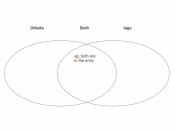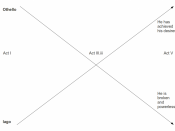'In the text Othello, how does Shakespeare criticize the human desire to control?'
It is known in human nature for people to feel the need to own control over others for their own satisfaction. Othello, a play written by William Shakespeare demonstrates ways in which the need for power and control end up destroying not only oneself but everyone around them.
"I follow him to serve my turn upon him," said Iago. From the start of the story Iago has a harsh intention bent on destroying Othello simply because the job that he wanted was given to young Cassio. With or without reasonable justification for revenge, Iago immediately starts to tear Othello apart by informing Brabantio that Desdemona is out with a black ram and committing unjust acts. Iago pursues power and the writer portrays this in a negative perspective as it is evident that as time progresses Iago becomes more wrapped up in his lies that he even begins to believe that Othello has slept with his own wife, Emelia, and now he has even more reason to hate "the Moor", "I hate the Moor and it is thought abroad that `twixt my sheets `has done my office".
Iago is so obsessed with his revenge on Othello that he does not care what happens to anyone else so long as he is happy. The writer succeeds as he demonstrates his point that by pursuing control over others there will be many consequences and as evidence it is portrayed that in the process of hurting Othello Iago manages to have Roderigo killed, Cassio severely injured, his own wife Emelia is murdered by his own hands, Desdemona dies at the hands of her husband Othello, and after everything Othello kills himself. Sadly Iago accomplishes his revenge and does gain control...


